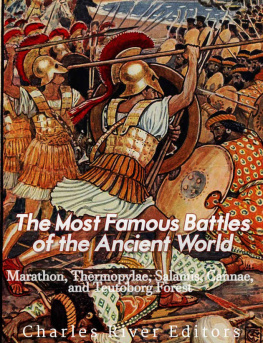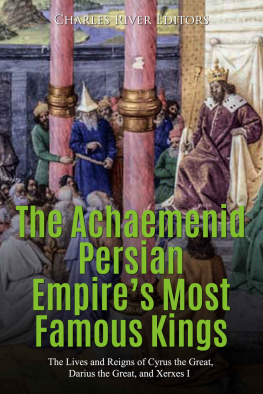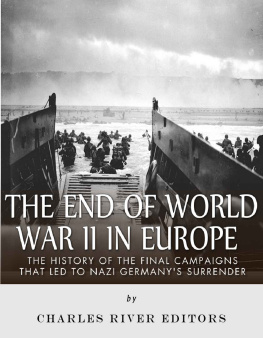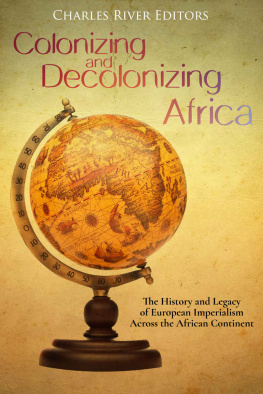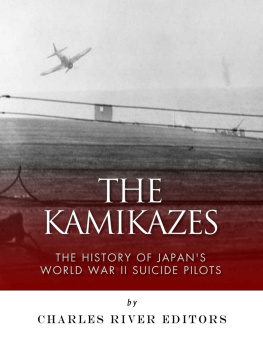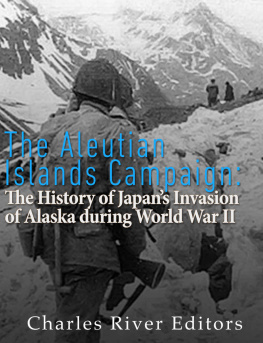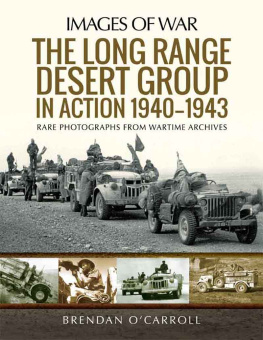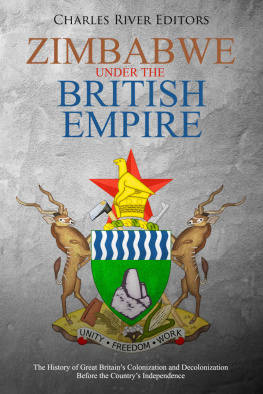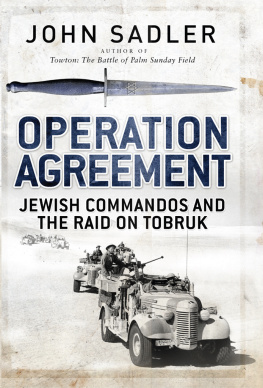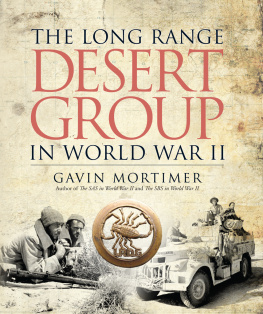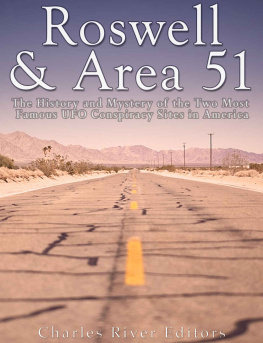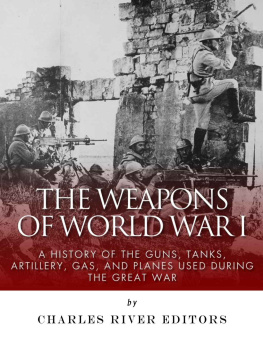Charles River Editors - The Long Range Desert Group: The History of the Elite British Army Unit during World War II
Here you can read online Charles River Editors - The Long Range Desert Group: The History of the Elite British Army Unit during World War II full text of the book (entire story) in english for free. Download pdf and epub, get meaning, cover and reviews about this ebook. year: 2018, publisher: Charles River Editors, genre: Romance novel. Description of the work, (preface) as well as reviews are available. Best literature library LitArk.com created for fans of good reading and offers a wide selection of genres:
Romance novel
Science fiction
Adventure
Detective
Science
History
Home and family
Prose
Art
Politics
Computer
Non-fiction
Religion
Business
Children
Humor
Choose a favorite category and find really read worthwhile books. Enjoy immersion in the world of imagination, feel the emotions of the characters or learn something new for yourself, make an fascinating discovery.

- Book:The Long Range Desert Group: The History of the Elite British Army Unit during World War II
- Author:
- Publisher:Charles River Editors
- Genre:
- Year:2018
- Rating:3 / 5
- Favourites:Add to favourites
- Your mark:
- 60
- 1
- 2
- 3
- 4
- 5
The Long Range Desert Group: The History of the Elite British Army Unit during World War II: summary, description and annotation
We offer to read an annotation, description, summary or preface (depends on what the author of the book "The Long Range Desert Group: The History of the Elite British Army Unit during World War II" wrote himself). If you haven't found the necessary information about the book — write in the comments, we will try to find it.
The Long Range Desert Group: The History of the Elite British Army Unit during World War II — read online for free the complete book (whole text) full work
Below is the text of the book, divided by pages. System saving the place of the last page read, allows you to conveniently read the book "The Long Range Desert Group: The History of the Elite British Army Unit during World War II" online for free, without having to search again every time where you left off. Put a bookmark, and you can go to the page where you finished reading at any time.
Font size:
Interval:
Bookmark:
By Charles River Editors

The groups badge

Charles River Editors is a boutique digital publishing company, specializing in bringing history back to life with educational and engaging books on a wide range of topics. Keep up to date with our new and free offerings with this 5 second sign up on our weekly mailing list , and visit Our Kindle Author Page to see other recently published Kindle titles.
We make these books for you and always want to know our readers opinions, so we encourage you to leave reviews and look forward to publishing new and exciting titles each week.

The Long Range Desert Group
The desert was quivering with heat. The gun detachments and the platoons squatted in their pits and trenches, the sweat running in rivers down their dust-caked faces. There was a terrible stench. The flies swarmed in black clouds upon the dead bodies and excreta and tormented the wounded. The place was strewn with burning tanks and carriers, wrecked guns and vehicles, and over all drifted the smoke and the dust from bursting high explosives and from the blasts of guns. Cecil Ernest Lucas-Phillips
The fighting in North Africa during World War II is commonly overlooked, aside from the famous battle at El Alamein that pitted the British under General Bernard Montgomery against the legendary Desert Fox, Erwin Rommel. But while the Second Battle of El Alamein would be the pivotal action in North Africa, the conflict in North Africa began all the way back in the summer of 1940, when Italian dictator Benito Mussolini declared Italys entrance into the war. From his perspective, the fact that the British and French had their hands full with the Germans created an opportunity for Italy to enlarge its colonial holdings in Africa by seizing portions of the British Empire. However, British troops in the colony of Egypt responded to Italys declaration of war by driving through the Egyptian-Ethiopian border and attacking Italian troops stationed in the Italian colony of Ethiopia. By September 13, 1940, Italian commanders in Ethiopia were finally ready to put Mussolinis plan into action and attack British colonial holdings, but British troops had already attacked a series of Italian frontier posts and had inflicted 3,500 casualties among Italys North African troops.
Although British maneuvering in North Africa began successfully against the Italians, the British forces suffered a series of defeats over the next two years, due to several problems the British army faced as a result of inadequate preparation and weaponry. For example, when the war began, junior officers were unprepared for the kind of cooperation between units that was necessary in the battles of North Africa. At the same time, while British tanks were capable of opposing Italian tanks, they were vastly inferior to German models.
Dealing with the Italians was one thing, but the British faced an entirely different monster in North Africa when Erwin Rommel, a German general who had gained much fame for his role in the invasions of Poland and France, was sent to North Africa in February 1941. For the next two years, the Allies would face off against the legendary Desert Fox and his Afrika Korps. As a specific unit, the Afrika Korps represented only a small part of the German forces deployed in the North African theater, but the term Afrika Korps has since come to imply all forces under Rommels command, and the Afrika Korps is now associated with all German war efforts in North Africa.
On August 1, 1945, a month before the formal end of World War II, the British War Office announced the disbanding of a small, eclectic unit, the Long Range Desert Group. Since its founding five years earlier, in June 1940, the LRDG had pioneered and refined the concept and tactics of deep penetration, covert reconnaissance in both the North African desert, and later as a more varied special forces operations unit in the Aegean, Italy and the Balkans. The LRDG, although built on work done during the North African desert campaigns of World War I, suffered a difficult gestation at the onset of World War II, and it was only much later revived after World War II in the era of Vietnam and the African counterinsurgency wars to become a standard configuration in most modern armies.
The Long Range Desert Group: The History of the Elite British Army Unit during World War II chronicles one of World War IIs most famous fighting units. Along with pictures depicting important people, places, and events, you will learn about the LRDG like never before.
There are two ways about deserts either you dislike intensely being in them or you find their attractions hard to resist. Major Bill Kennedy Shaw of the Long Range Desert Group
The story of the Long Range Desert Group begins with the life and career of a British army officer, Major Ralph A. Bagnold of the Royal Signals Corps. Bagnold was one of those great products of the British imperial era, gifted with a bold and innovative spirit, and a world that was still wide-open for exploration and discovery. He also belonged to one of the great institutions of the age, the British Army, which offered scope to young men of respectable birth, reasonable education and exceptional ability to serve in any number of capacities, and in numerous remote corners of the world.

Bagnold
Bagnold came from army stock, and he was a product of the Royal Military Academy Woolwich, the same institution responsible for Lord Herbert Kitchener, one of the great British generals of the age. After World War I, during which he survived three years in the trenches of France, he studied engineering at Cambridge, before returning to active duty in 1921. He was posted first to Cairo, where much of the time he was to be found adrift in the Western Desert, availing himself of the innovation of motorized transport, most particularly the Ford Model A, ubiquitous by then throughout the empire. Later, he did much the same along the North-West Frontier of India, developing his ideas of motorized reconnaissance based on what he knew of similar work undertaken in World War I.
During the Great War, the British fought a guerrilla campaign against the Senussi clans of Libya. The Senussi were primarily at war with the Italians in a campaign coordinated by the Ottomans to resist the Italian occupation of Libya. As something of a side campaign, however, they also engaged British forces in Egypt, raiding from bases deep in Cyrenaica. Graduating from the age of camel transport in the desert, the British deployed a small force mounted on adapted Ford Model T motorcars, known as the Light Car Patrol. This tactic proved extremely effective against Senussi raids, neutralizing immediately the Senussi use of the vast, waterless distances as a weapon of war.
The lesson learned by this experiment, however, was virtually discarded at the end of the war, and no real effort was made to integrate the concept of rapid mobile deployment using motorized transport, either for offensive of reconnaissance purposes into standing military formations. It was only the continued private use of motor vehicles, either for purposes of exploration or desert travel and archaeology that kept the idea alive.
Font size:
Interval:
Bookmark:
Similar books «The Long Range Desert Group: The History of the Elite British Army Unit during World War II»
Look at similar books to The Long Range Desert Group: The History of the Elite British Army Unit during World War II. We have selected literature similar in name and meaning in the hope of providing readers with more options to find new, interesting, not yet read works.
Discussion, reviews of the book The Long Range Desert Group: The History of the Elite British Army Unit during World War II and just readers' own opinions. Leave your comments, write what you think about the work, its meaning or the main characters. Specify what exactly you liked and what you didn't like, and why you think so.

